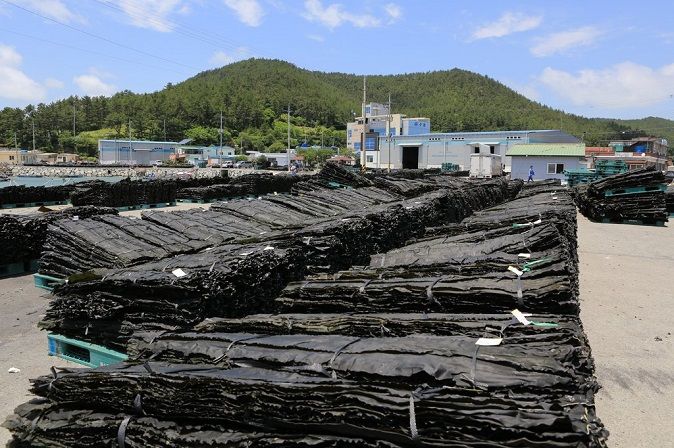KIST Biochar Uses Recycled Kelp to Remove Toxic Heavy Metals from Water
Published on by Water Network Research, Official research team of The Water Network in Technology
 This photo provided by the Wando County Office on June 15, 2018, shows kelp or "dashima" harvested from the green seashores of Wando, South Jeolla Province.
This photo provided by the Wando County Office on June 15, 2018, shows kelp or "dashima" harvested from the green seashores of Wando, South Jeolla Province.
This photo provided by the Wando County Office on June 15, 2018, shows kelp or “dashima” harvested from the green seashores of Wando, South Jeolla Province.
SEOUL, Dec. 29 (Korea Bizwire) — A South Korean research team has succeeded in developing a new biochar that can replace activated charcoal by recycling seaweed like kelp.
The Korea Institute of Science and Technology said Tuesday its research team had developed a biochar (a compound word of biomass and charcoal) material that can adhere to and remove the toxic heavy metal antimony in the water.
When discharging industrial wastewater, it is common to lower the concentration of heavy metals that are generated at various industrial sites using activated charcoal.
However, South Korea currently relies on imports for about 70 percent of the activated charcoal it consumes.
The research team developed a new type of biochar using waste seaweed that is dumped by fishing farms.
To retrieve the biochar that adheres to heavy metals using an external magnetic force, a micro circular magnetic material is coated on the surface of the biochar.
To maximize the newly-developed material’s specific surface area to contact polluting materials, micro circular particles were compounded in a hierarchical format.
The research team confirmed that the newly-developed biochar has an antimony removal efficiency rate of more than 90 percent, a condition similar to distilled water.
Taxonomy
- Heavy metals
- Biochar
1 Comment
-
Has there been any test work on what other metals it recovers? How often does it need to be replaced? How much does it cost?